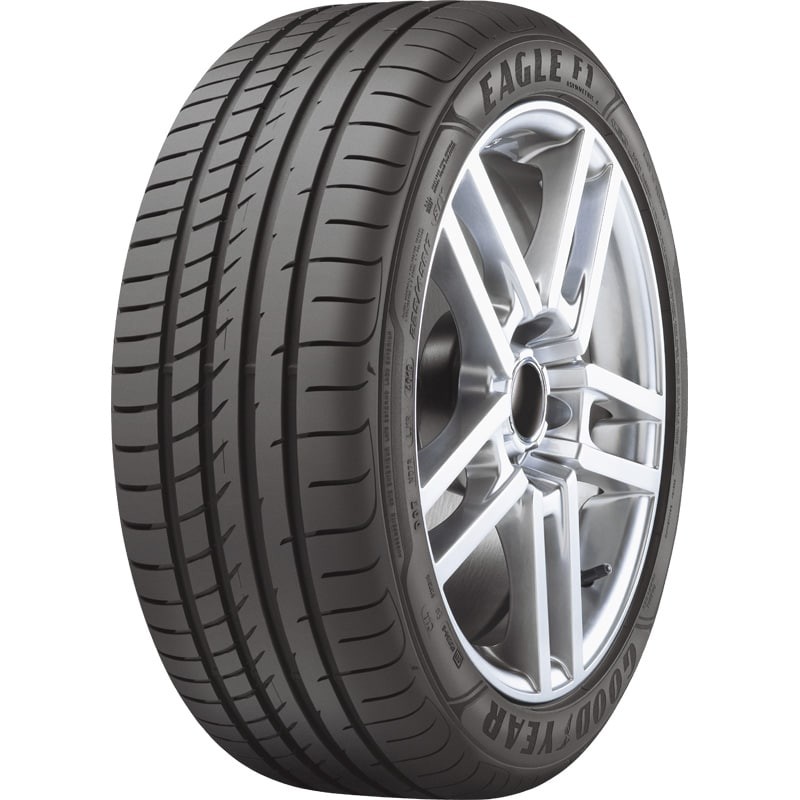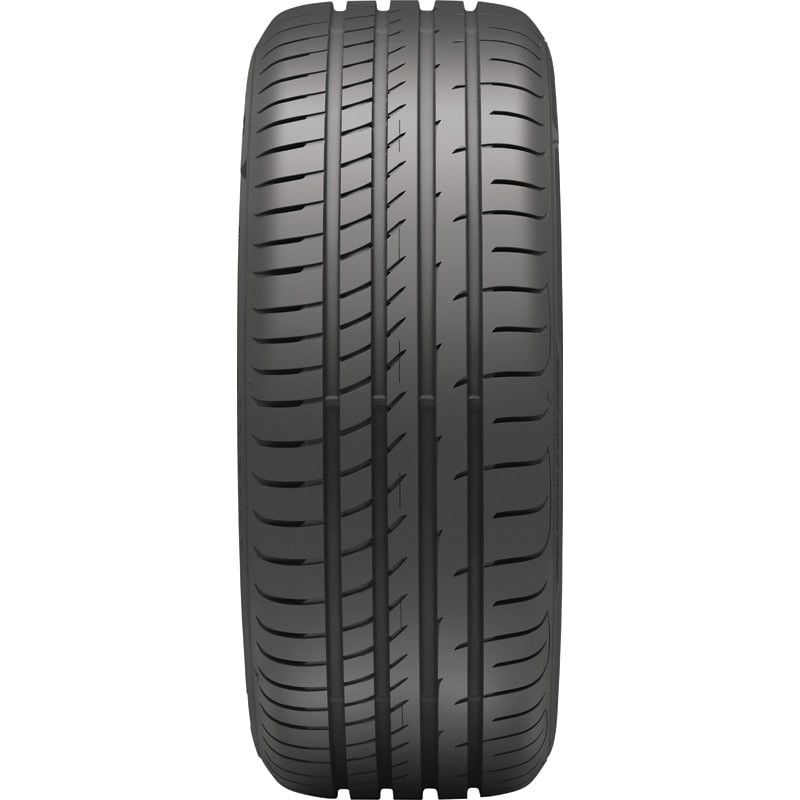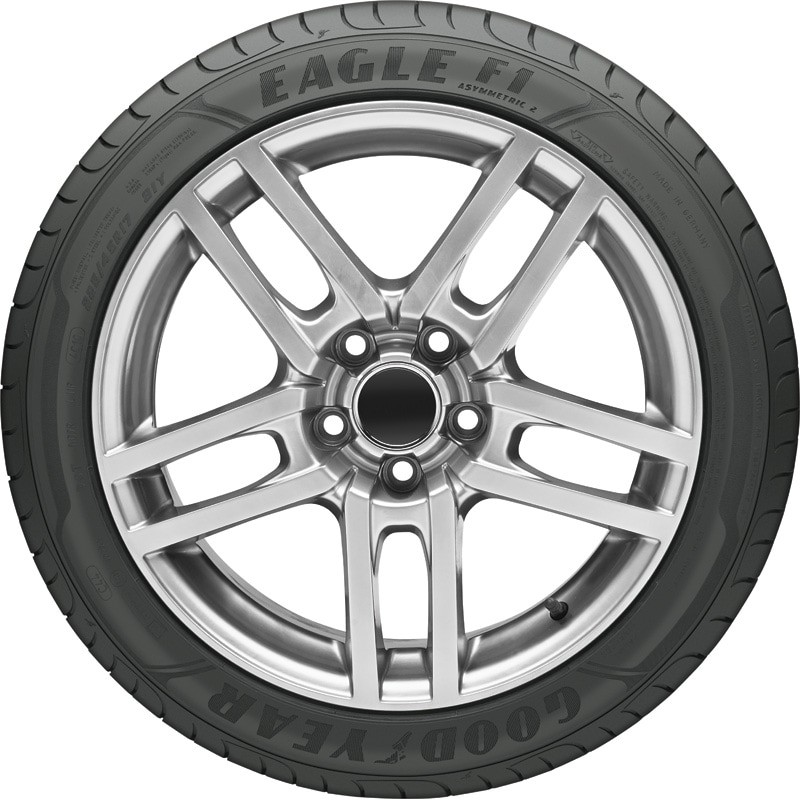To begin with, what kind of tires do we now consider as "too sporty for law-abiding townspeople." The Eagle F1 Asymmetric 2 was a sort of Goodyear response to not only the Michelin Pilot Super Sport and Continental Sport Contact 6 introduced earlier.
The Asymmetric Two had served as a permanent Goodyear delegate in the high-speed tire segment for five years, but it was still far from ideal. The tire was praised for comfort, handling on dry asphalt, acceleration, and braking dynamics, but in weakness, they wrote down excessive information content, excessive softness, and, as a consequence, insufficient vehicle maneuverability on wet surfaces. At least compared to other high-speed tires.
Spaniards liked
They are available in 41 sizes for 17 "to 20" rims.
The asymmetric non-directional tread allows you to maintain stable contact with the road surface under heavy loads, especially when cornering and changing lanes. These tires have good lateral stability and are often found in the sports tire segment where good handling is very important.
This universal, well-known data correlates perfectly with the tire information provided by the manufacturer. Goodyear cited a 31% longer lifespan and improved braking performance on wet and dry asphalt as the main differences from its UHP segment rivals. Other strengths of the Eagle F1 Asymmetric 2 include responsive handling and control on dry and wet surfaces.
Everything is in place, but something is wrong
The first thing that I noticed after changing shoes and unhurried driving around the city was improved working out of "familiar" road irregularities. Previous summer and friction winter tires leaked more information about rails, road joints, and pit edges, while the Eagle F1 Asymmetric 2 filters better road information under the wheels - a result of the reinforced and lightweight tire carcass.
There was also less noise, which on uneven and rough asphalt followed me with previous tires of other brands. To be precise, the Eagle F1 Asymmetric 2 is 67-68 decibel. The same volume as that of the tested tires has a loud conversation heard from a distance of 1 meter.
The already mentioned strong reinforced construction of the tires is reflected in the sharpness of reactions and the accuracy of the tire handling. The rigid frame minimized the deformation of the wheel during maneuvers - by the way, testers of the "two" from many continents complained about this, but I cannot recognize this in the new Asymmetric 2. If suddenly you need to make one - or better a series - of sharp maneuvers, you will feel how the car's behavior has changed. He became steadfast and harsh, reactive and obedient. And most importantly, it has become much more pleasant to operate it!
Gum effect
When accelerating on a motorway, the silence of the tire can play a trick. In the process of getting used to high-speed tires, it is very easy not to notice how you are exceeding the speed allowed not only by the rules but also by your own, internal restrictions.
It's about yawing in a rut. This may be a temporary feature of the tires, which will weaken after the first few thousand miles. However, so far there is something to add to the "shortcomings" column. When a car hits a rut, it shakes from side to side, forcing the driver to hold on to the steering wheel more tightly.
Moving on to the fun part. High-speed tires that can keep the Panamera and Camaro SS in the trajectory are capable of pushing the boundaries of a simple "civil car" reasonable for a driver. Perhaps each driver has his own, familiar, speed of passing 90-degree turns, bends of interchanges, arcs of exits from the roundabout, and other elements of urban road infrastructure s routinely overcome on the way from home to work and back.
Perhaps, on your old "civilian" tires, you realized that you can add a little gas and, keeping in the trajectory, slightly accelerate. But only slightly, because the loss of adhesion is already somewhere very close. The Eagle F1 Asymmetric 2 made me rethink my comfort zone; compared to a comfortable civilian ride, these tires have such a large "grip" reserve that it will take tremendous endurance not to go all out in search of the moment of loss of this very grip.
If you ask Goodyear techies how they did it, they'll say Grip Booster technology helped. This is a special rubber compound using natural resins. The mixture makes the tread adapt to the roughness of the track and stick to it like gum to a boot. With one exception - pieces of rubber from the tire are not torn out anywhere. On the contrary, marketers assure that the Eagle F1 Asymmetric 2 will last eleven and a half thousand kilometers longer than its main competitors, but I cannot yet confirm this fact.
To a "wet" case
The behavior on the wet road - according to the tests of some Russian and foreign publications - has not yet become a reason for Goodyear to be proud of the Eagle F1 Asymmetric 2. In a single test, it is extremely difficult for me to place these tires in the right place among competitors, but my impressions of the fast driving on wet asphalt, I am obliged to share.
Looking at the tread of the tires, it seems that water drainage is not their strongest point due to the not particularly frequent siping. However, one should not judge by the clothes: the car can only "float away" in a deep puddle, and on wet and even asphalt the speed of derailment from the trajectory is far beyond reasonable limits. A series of tire provocations with a constant increase in the speed of entering 90- and 130-degree turns did not lead to drift or skidding, the car stubbornly held the trajectory and quickly obeyed the steering wheel instructions. Finally, common sense prevailed, and I decided to stop testing since life-loving drivers do not tend to develop the speed in corners that I reached, looking for the brink of a breakdown.
The Active Braking "system" is responsible for the Eagle F1 Asymmetric 2's ability to effectively and promptly decelerate the vehicle. Active Braking Technology has helped to increase the contact patch during braking, significantly shortening the stopping distance. And I had no complaints about the speed and quality of deceleration; there is a suspicion that non-original brake pads installed on my car have much less potential than Asymmetric 2. The sedan instantly slows down in the exercise "staring at", imitating driving in the yard, when a pet or a gape pedestrian "jumps" under the wheels.
What's the bottom line?
Now, let's get back to the question in the title. Yes, I'm sure a civilian car definitely won't be harmed by high-speed tires. Moreover, I did not find any arguments against their installation. In terms of importance, I arranged the arguments for myself as follows.
Safety. It would never occur to a sane person to drive in the city at a speed that these tires cannot handle. In addition, the high potential of adhesion properties protects in the event of a steering error or an unforeseen traffic situation.
Pleasure. It is possible to experience positive emotions from active driving, moreover, without going beyond the speed limit. The truth is, do not forget about the settings and characteristics of the car itself.
Practicality. Unlike sports cars, you don't have to pay for the operation of sports tires with your comfort. On the contrary, it has become an unexpected advantage for them.
Reasonable price. The price of the Eagle F1 Asymmetric 2 is lower than most other high-speed tires and a thousand rubles per tire higher than the tires of the lower-speed segment.



